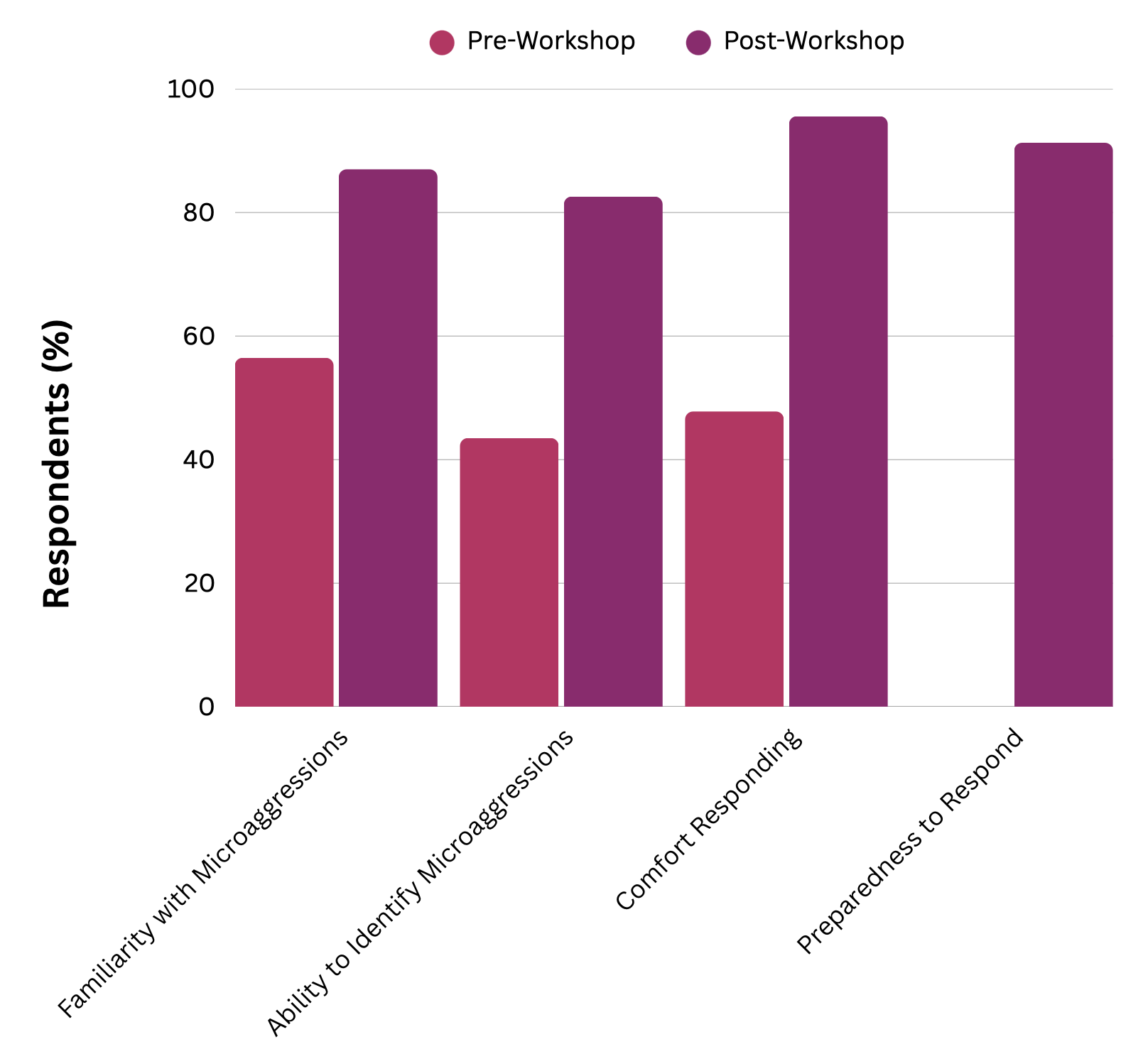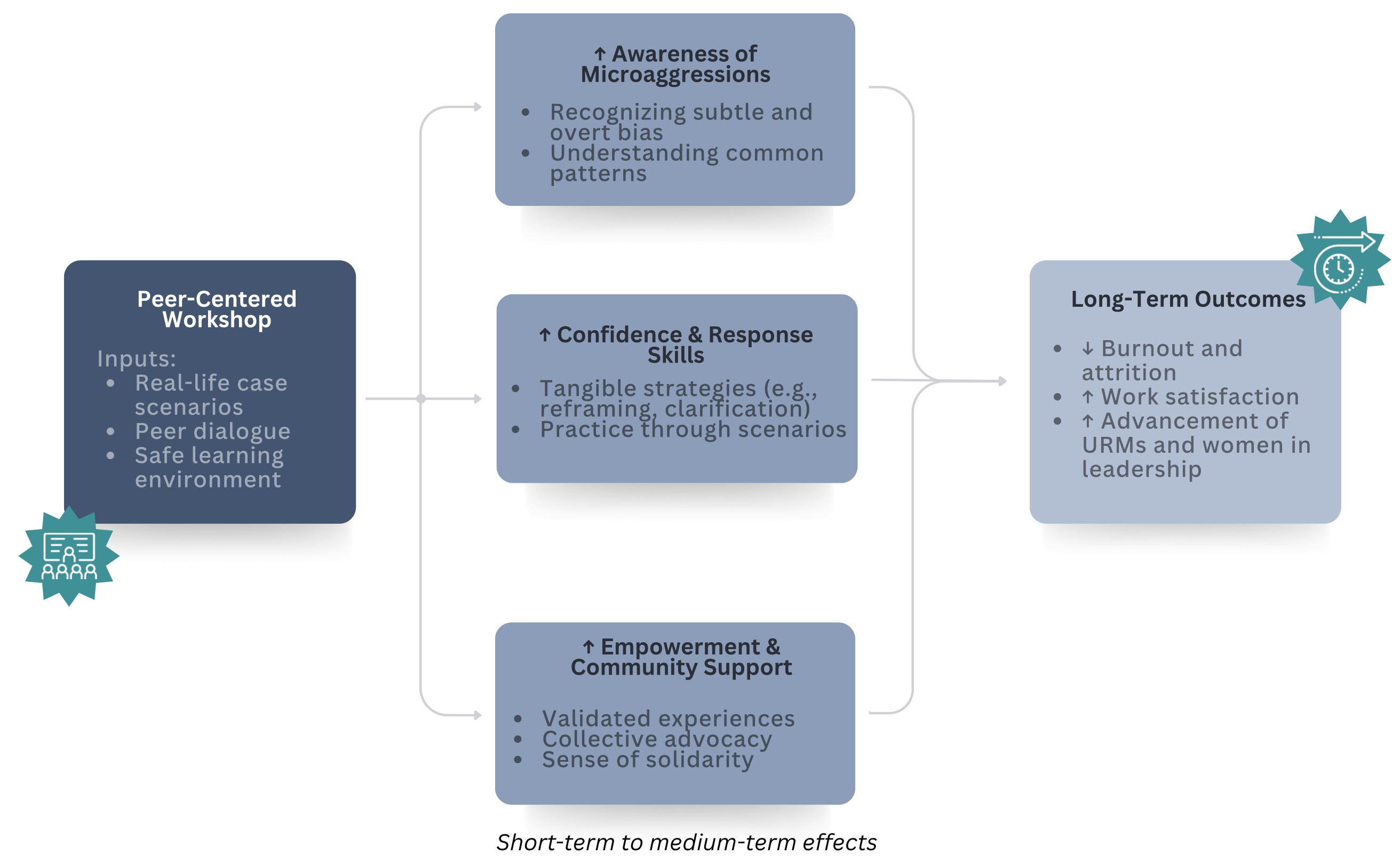Sunday Poster Session
Category: Practice Management
P1921 - Not Just Lip Service: A Peer-Led Initiative That Moves the Needle on Gender Equity in GI
Sunday, October 26, 2025
3:30 PM - 7:00 PM PDT
Location: Exhibit Hall

Chioma Owo, MD
University of Texas Health San Antonio
San Antonio, TX
Presenting Author(s)
Chioma Owo, MD1, Lavanya Viswanathan, MD, MS, FACG2
1University of Texas Health San Antonio, San Antonio, TX; 2UT MD Anderson Cancer Center, Houston, TX
Introduction: Despite increased representation of women in gastroenterology (GI), gender-based microaggressions persist and contribute to burnout, decreased confidence, and career attrition. Women in GI continue to report limited access to mentorship, procedural training, and leadership roles. Developed through the ACG Summer Scholars Program, this study hypothesizes that participation in a peer-centered workshop on microaggressions will lead to measurable improvements in attendees’ awareness of bias, perceived ability to address microaggressions, and sense of professional empowerment. Peer-centered education may be a valuable tool to enhance awareness, solidarity, and skills to navigate these challenges.
Methods: A 28-item anonymous pre- and post-survey was administered to 47 registered attendees of an in-person 2024 peer-centered workshop on microaggressions. The survey assessed experiences with bias, comfort addressing it, perceived institutional support, and changes in awareness and preparedness. Quantitative data were analyzed descriptively; open-ended responses were reviewed for themes.
Results: 23 participants, ranging from trainees to senior faculty, completed the survey.
Discussion: Peer-centered workshops can increase recognition of gender-based microaggressions and show that strategies to address bias can be taught and learned. Such programming fosters awareness, shared understanding, and empowerment—offering a meaningful complement to institutional efforts. Incorporating microaggression-focused education into professional development may improve job satisfaction, reduce attrition, and support URM advancement. Future directions include expanding workshops to more diverse audiences—including men—to explore allyship and broader impacts on inclusion and equity.

Figure: Figure 1. "Pre- and Post-Workshop Shifts in Microaggression Awareness and Response Readiness"
Pre- and post-workshop comparison showing increased familiarity, identification, comfort, and preparedness to address microaggressions. Percentages reflect respondents selecting top-tier responses (e.g., “very” or “extremely”).

Figure: Figure 2: "From Recognition to Empowerment — Conceptual Framework of Workshop Impact"
Illustrates how peer-centered workshops lead to increased awareness, confidence, and support, ultimately contributing to long-term professional equity outcomes
Disclosures:
Chioma Owo indicated no relevant financial relationships.
Lavanya Viswanathan: Ardelyx, Inc. – Advisor or Review Panel Member, The above are unpaid., Speakers Bureau.
Chioma Owo, MD1, Lavanya Viswanathan, MD, MS, FACG2. P1921 - Not Just Lip Service: A Peer-Led Initiative That Moves the Needle on Gender Equity in GI, ACG 2025 Annual Scientific Meeting Abstracts. Phoenix, AZ: American College of Gastroenterology.
1University of Texas Health San Antonio, San Antonio, TX; 2UT MD Anderson Cancer Center, Houston, TX
Introduction: Despite increased representation of women in gastroenterology (GI), gender-based microaggressions persist and contribute to burnout, decreased confidence, and career attrition. Women in GI continue to report limited access to mentorship, procedural training, and leadership roles. Developed through the ACG Summer Scholars Program, this study hypothesizes that participation in a peer-centered workshop on microaggressions will lead to measurable improvements in attendees’ awareness of bias, perceived ability to address microaggressions, and sense of professional empowerment. Peer-centered education may be a valuable tool to enhance awareness, solidarity, and skills to navigate these challenges.
Methods: A 28-item anonymous pre- and post-survey was administered to 47 registered attendees of an in-person 2024 peer-centered workshop on microaggressions. The survey assessed experiences with bias, comfort addressing it, perceived institutional support, and changes in awareness and preparedness. Quantitative data were analyzed descriptively; open-ended responses were reviewed for themes.
Results: 23 participants, ranging from trainees to senior faculty, completed the survey.
- Pre-workshop: 100% had experienced and 96% had witnessed microaggressions. Only 47.8% felt moderately to extremely comfortable addressing them. 59% reported inadequate institutional gender equity efforts.
- Post-workshop: 87% reported increased familiarity with microaggressions; 100% felt more aware of when they occur; 95.6% felt moderately to extremely comfortable responding, and 91.3% felt better prepared to intervene.
- Eighty-two percent planned to implement strategies such as seeking clarification (70%), reframing (57%), and addressing bias in evaluations (74%).
- The workshop was rated very or extremely effective by 87%, with peer dialogue, real-life examples, and actionable tools cited as key to its success.
Discussion: Peer-centered workshops can increase recognition of gender-based microaggressions and show that strategies to address bias can be taught and learned. Such programming fosters awareness, shared understanding, and empowerment—offering a meaningful complement to institutional efforts. Incorporating microaggression-focused education into professional development may improve job satisfaction, reduce attrition, and support URM advancement. Future directions include expanding workshops to more diverse audiences—including men—to explore allyship and broader impacts on inclusion and equity.

Figure: Figure 1. "Pre- and Post-Workshop Shifts in Microaggression Awareness and Response Readiness"
Pre- and post-workshop comparison showing increased familiarity, identification, comfort, and preparedness to address microaggressions. Percentages reflect respondents selecting top-tier responses (e.g., “very” or “extremely”).

Figure: Figure 2: "From Recognition to Empowerment — Conceptual Framework of Workshop Impact"
Illustrates how peer-centered workshops lead to increased awareness, confidence, and support, ultimately contributing to long-term professional equity outcomes
Disclosures:
Chioma Owo indicated no relevant financial relationships.
Lavanya Viswanathan: Ardelyx, Inc. – Advisor or Review Panel Member, The above are unpaid., Speakers Bureau.
Chioma Owo, MD1, Lavanya Viswanathan, MD, MS, FACG2. P1921 - Not Just Lip Service: A Peer-Led Initiative That Moves the Needle on Gender Equity in GI, ACG 2025 Annual Scientific Meeting Abstracts. Phoenix, AZ: American College of Gastroenterology.
